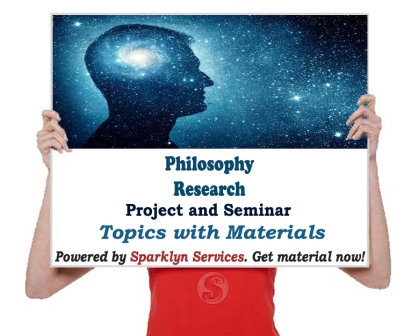Introduction
1.1 Background Of The Study
Soren Kierkegaard is regarded as the father of contemporary existentialism. Existentialism, according to J. I. Omoregbe (39) deals “with concrete existence as opposed to essence”. This means, for the existentialists, existence precedes essence. Kierkegaard, described by Wittgenstein (cited in Pattison, 1) is “by far the most profound thinker of the last century”. His notion of human existence stems from the fact that Hegel metaphysical idealism presented human existence in an abstract, objective form. Kierkegaard saw Hegel’s philosophy “as inadequate because it shifted attention away from the concrete individual to the concept of universal” (Ozumba 86). For Ozumba (86) this implies that Hegel “merely invited humans to think instead of seeing them as existent being that should be involved in decisions and commitment that have bearing to their individuality and existence”. Kierkegaard’s thought also served as a reaction against speculative philosophy.
In his reaction, Kierkegaard built his existential thought in such a manner that it tended to become “a clarification of issue and an appeal to choose, an attempt to get men to see their existential situation and the great alternatives with which they are faced” (Copleston 336). Kierkegaard’s quest was to dismiss the conception of human existence from abstract object to questions that confront the individual as an existing being. Questions such as: What is the meaning of human life? How can one live authentically as a human person? What is the meaning of human freedom? How can one use his freedom in the face of moral chaos?, are pertinent. Kierkegaard understood existence as a distinctive way of being, and that humans often focus on thought of a group to the detriment of their own unique individuality. Other than being an authentic individual, he is therefore subsumed in the crowd, thus, losing his individual self to abstract objective and societal control. In this sense, what it means, therefore, to be an authentic human being forms energetic question prompting this research on Soren Kierkegaard.
1.2 Statement Of The Problem
The question of human existence has attracted so many considerations. There are some who approached it from the point of view of its absurdity and meaninglessness. Most of such people are atheists like Martin Heidegger, with Albert Camus and Jean Paul Sartre who played down very much, the essence of human existence as Hegel also did. However, there is the other group of existentialists who discussed human existence as a worthwhile venture. Such include the chief founder of contemporary existentialism in the person of Soren Kierkegaard. These philosophers expounded certain existential tenets which according to Lescoe (9) are geared towards “analyzing the basic structures of human existence and to call individuals to an awareness of their existence in its essential freedom”.
The problem of human existence is related wholly to this concept of freedom. Its use and abuse makes and mars man respectively. This is because freedom remains the pivot upon which man asserts himself. It is his relationship to this that categorizes him either as authentic or inauthentic individual. Thus, the measure of the meaningfulness or meaninglessness of life is highly subjective but whichever way it is determined by the degree of commitment which one puts in as he tries to assert himself by the exercise of freedom.
Another question to be examined here remains whether one can live authentically when one has no authentic relation to the community which Kierkegaard regard as the crowd? It also takes into consideration the question of freedom and choice, man’s quest for existential meaning and Kierkegaard’s analysis of man’s stages on life way.
It is therefore in a bid to clarify some of these mind-bogging issues that the researcher is out to expose what Kierkegaard considers to be the gauge or the standard of meaningful human existence. With this in view, the work is a confrontation of man with the naked facts of his freedom and duty through which he makes the best out of his life as an individual.




